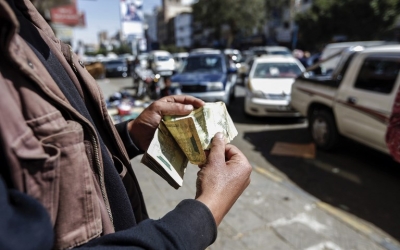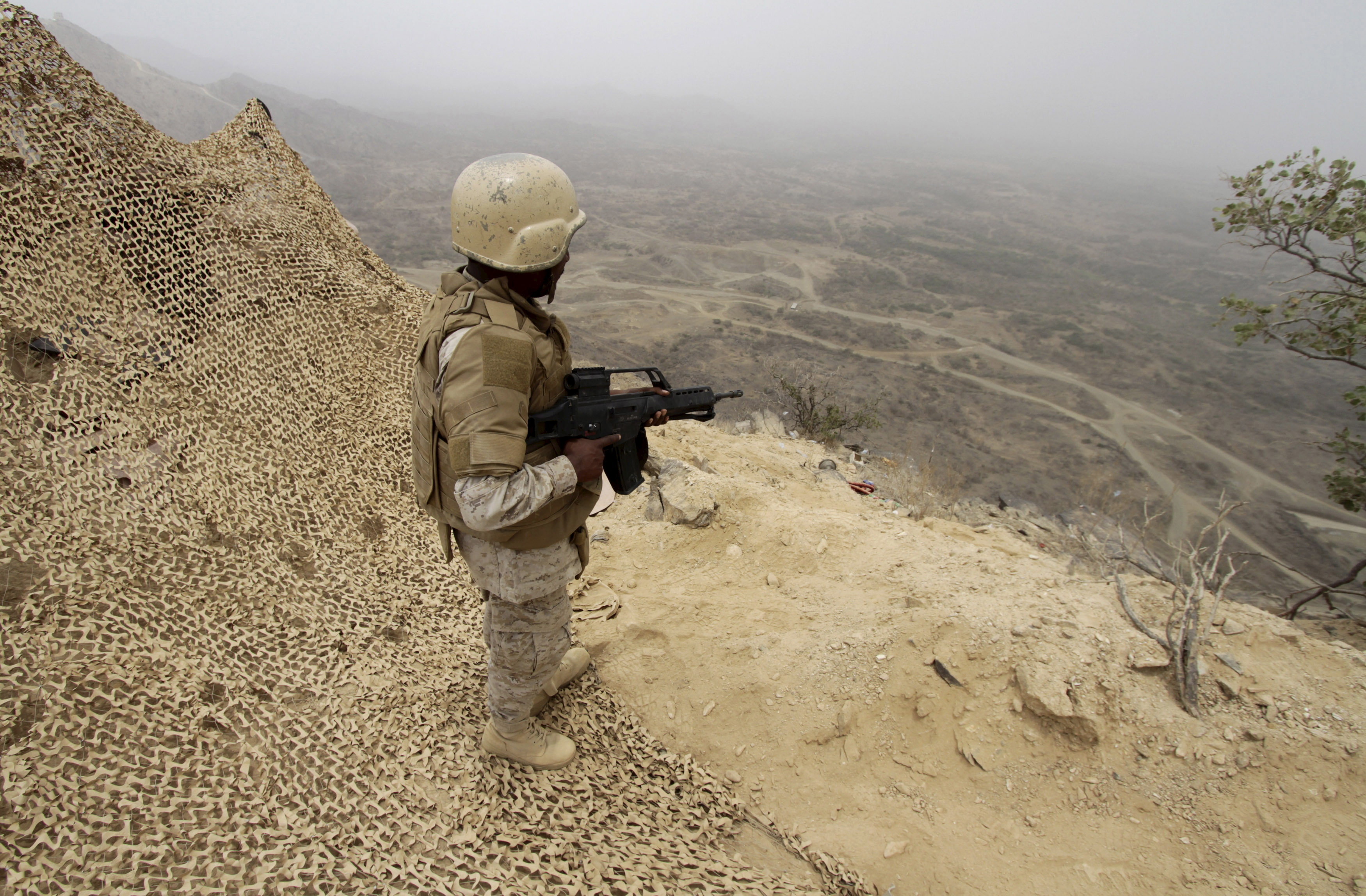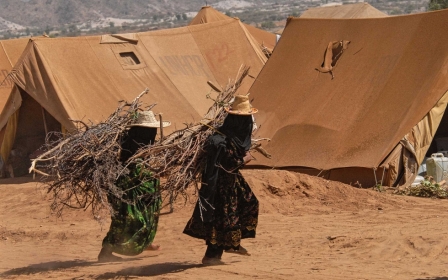Drawn by Saudi cash, Yemeni mercenaries are left high and dry

The thought of fighting in one of the various factions battling in Yemen's brutal civil war never crossed Adel's mind.
Until he lost his job in the public water service of Taiz city, that is.
Suddenly the father of two daughters found himself struggling to feed his family, and from 2015 he found providing for his wife and children a daily difficulty.
Last year, feeling at his lowest as unemployment and skyrocketing prices bit hard, the 37-year-old decided to become a mercenary, and fight for Saudi Arabia against Yemen's Houthis along the two countries' border.
"Dozens of my neighbours of different ages participated in battles before me and they returned with a lot of money, so I started to think about fighting," Adel told Middle East Eye.
New MEE newsletter: Jerusalem Dispatch
Sign up to get the latest insights and analysis on Israel-Palestine, alongside Turkey Unpacked and other MEE newsletters
"My neighbours told me that they do not face any danger in the battles, and the air strikes usually target the Houthis while they shot at the Houthis from safe areas."
I decided to join the battles so I could reduce the suffering of my family
- Adel, wounded mercenary
Persuaded that joining the Saudi ranks would be safe, Adel decided to enlist.
Signing up was simple. There are several brokers in Taiz who hook potential fighters up with the Saudis and send the new recruits to the city of Dhahran al-Janub in southern Saudi Arabia.
"Finally I decided to join the battles so I could reduce the suffering of my family and provide them with all their needs," Adel said.
"When I told my wife about my decision, she welcomed it and encouraged me to join the battles. She had also heard stories of those fighting with Saudi Arabia returning with a lot of money."
As revealed by MEE in 2017, thousands of desperate Yemenis are being recruited by Saudi Arabia to defend its borders against Houthi rebels.
The Yemeni mercenaries allow Saudi soldiers to stay far from the fighting, orchestrating air attacks on Houthi targets from afar.
In April, Adel became one of those mercenaries. He received three weeks of training in Dhahran al-Janub before being sent to the southern Saudi region of Najran.
"I participated in several battles against the Houthis on the border in Najran and some of my fellow soldiers were killed and wounded beside me," Adel recalled.
"But I did not flee the battles as I used to receive 500 Saudi riyals [$130] for each attack, in addition to 3,500 Saudi riyals [$933] per month.”
The average wage of a soldier in Yemen's army is around $100 a month.
Far from the safety he was assured of by his neighbours, Adel found himself repeatedly fighting in pitched battles.
In October, he was caught up in the worst yet.
"Around 20 fighters, including me, participated in an attack on the Houthis, but then Houthis besieged us for two days and the air strikes did not target them to break our siege," Adel said.
In Najran I was about to starve to death under the siege and I truly realised what starvation is
- Adel, wounded mercenary
Surrounded on all sides and lacking food and water, Adel and his companions decided it would be better to flee rather than starve to death.
"Before I went to Najran my family was suffering from a lack of food, but in Najran I was about to starve to death under the siege and I truly realised what starvation is," Adel said.
As they made a break for it, Houthi fighters picked off several fighters, killing some and wounding others.
"While I was fleeing the siege, the Houthis targeted us with shelling, and shrapnel penetrated my stomach. I fainted and I was not aware of what had happened."
True suffering begins
For Adel, that is when his suffering truly began.
"When I recovered consciousness I found myself in our camp's clinic and some friends were helping me with first aid. They had already stitched up my stomach," Adel said.
"They told me that some colleagues were killed so I was happy that I was still alive."
That happiness did not last long, however, when he realised that adequate assistance from the country he was fighting for was not going to be forthcoming.
"I thought that the Saudis would take me to a Saudi hospital, but our Yemeni leader came and gave me 500 Saudi riyals and told my companions to send me to Yemen."
Out of options, Adel was forced to go home, assisted by some of his fellow fighters who decided to help get the badly wounded man back to Taiz.
"We travelled from Najran to Marib and then onto Taiz, while I lay on a mattress the whole time."
The journey took three days, and the whole way back Adel worried about the reaction his family would have to his invalid state.
"My neighbours had already told my family that I was killed, and then they told them that I was seriously wounded, so when I got home my family accepted my condition."
By late October Adel was home. Now disabled, he cannot work, and in order to eke out a living he is dependent on the largesse of generous people and aid groups.
"The Saudis have not helped me recover from my injury at all and I am not a soldier, so neither the Saudi nor Yemeni governments are helping.
"Money goes and suffering remains."
Families left behind
With Adel unable to work, his family scrambles to cover costs. But they at least have him alive.
Others, like the family of Asaad, were not so lucky.
When Asaad's father died three years ago, the university student suddenly found himself as his family's breadwinner.
But he struggled to provide the five members of his family with even the most basic of commodities.
Like Adel, his difficulties to provide drew him to Taiz's brokers.
"Asaad joined Saudi Arabia's battles to provide us with money, but we did not receive any money and I lost my son," his mother Hanan told MEE.
"He travelled in December 2018 and his fellow fighters told me he was killed in the same month," she added.
"I didn't want him to join the battles, but he escaped the house and signed up. I hoped to see his corpse, but no one knows where it is."
Hanan said the family is suffering without the occasional income Asaad used to provide.
"Neither the Saudis nor the Yemeni government help us with money," she said, adding that the 22-year-old was not added to a list of martyrs, which would have seen the family receive a stipend of cash.
Hanan is heartbroken. She prays to God, asking for the devastating four-year war, which has cost tens of thousands of lives, to be put to an end.
"I do not want to see mothers lose their sons like me," she said. "I hope the warring sides stop this absurd war and Yemen returns to how it was before."
No responsibility
In the eyes of the Yemeni government, Yemenis who have been hired to fight by its ally Saudi Arabia are mercenaries and therefore it is not responsible for their well-being.
"The government is not responsible for the mercenaries who go to Saudi Arabia through brokers, the government is only responsible for the official soldiers who fight everywhere around the country," a source in the interior ministry, who spoke on condition of anonymity, told MEE.
According to the source, the government helps wounded soldiers with proper healthcare and give the families of those killed in battle monthly stipends. The government is recruiting new soldiers all the time, he added.
I advise our youths not to seek out brokers who lead Yemenis to hell
- Interior ministry source
"If anyone wants to join the Yemeni army to fight against the Houthi rebels, we can recruit new soldiers, so I advise our youths not to seek out brokers who lead Yemenis to hell," the source stressed.
With significantly larger salaries offered by the Saudis, however, it is not surprising that desperate Yemenis are having their heads turned and end up fighting along the border.
And as if life under war wasn’t hard enough, Yemenis are living through a crippling economic crisis.
Since a Saudi-led coalition intervened in the conflict on the government’s behalf in 2015, the Yemeni riyal has lost half its value.
Meanwhile, prices of basic goods have risen and risen, as 20 million Yemenis found themselves reliant on aid to survive.
Mamoon Mohammed, a sociology expert in Taiz, told MEE: "The economic crisis is only one reason behind the recruitment of mercenaries, but the main reason is the absence of the authorities.
"We can find mercenary brokers everywhere and the government cannot stop them. This definitely encourages desperate Yemenis to join battles as mercenaries."
Mohammed noted official Yemeni soldiers receive small salaries in comparison and so suffer economic problems like other Yemenis, which puts many off from joining the army.
"Moreover, some soldiers have left their official jobs and joined the Saudis' battles as mercenaries," he added.
Scarred quite literally by his experience, Adel reflects from his bed on the choices Yemenis like him are making to this day.
He said he wishes the Yemeni government would do more to stop this flow of mercenaries heading to the Saudi front.
"I advise anyone wants to fight with Saudis to come and see my suffering and then definitely he will change his decision," Adel said.
"Money is not everything – it is nothing."
This article is available in French on Middle East Eye French edition.
Middle East Eye delivers independent and unrivalled coverage and analysis of the Middle East, North Africa and beyond. To learn more about republishing this content and the associated fees, please fill out this form. More about MEE can be found here.








